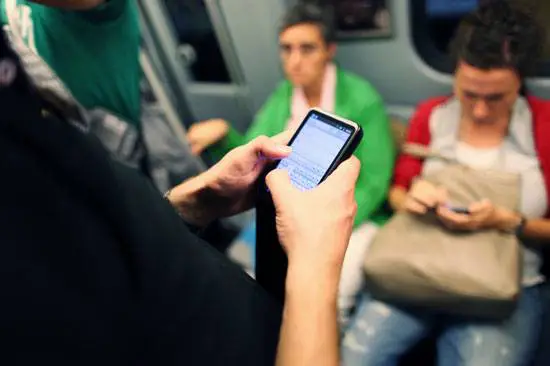Our smartphones have become more like mini mobile computers than cell phones. We use them to stay in touch — calling, texting, and e-mailing — as well as to manage our busy lives — shopping online, banking, paying bills, and much more. With everything we do on our smartphones, we are storing a lot of sensitive data that could easily fall into the wrong hands if our phones were lost or stolen. (Just think of all those times you forgot your phone at a friend’s house or on the counter in a store or restaurant…)
[For those using iPhone, check out : How to use The Kensington BungeeAir Power Wireless Security Tether and you will never leave your iPhone behind]
Just like with a computer, there are a number of ways you can protect your data and personal information on a cell phone. Here are a few tips:
Lock It
The first and most obvious step is to put a password on your phone. Sure you’ll have to enter your password every time you open your phone to make a call, send a text, or do anything else, but so will anyone else. Dedicated hackers will find a way past this, but at least you’ll be able to weed out amateur snoops — like your girlfriend.
[Read also: 10 Tips to Secure Your Mobile Devices]
Install Security
You run antivirus software on your computer, why wouldn’t you do so on your cell phone, too? (You DO run antivirus software on your computer, right??) Download a trusted security app or antivirus software to protect your phone from snoops and malicious software.
Practice Safe Browsing
A little common sense goes a long way. If you’re the type of person who doesn’t think twice about walking down an alley at 3 a.m., you are likely to be robbed at some point. If you’re the type of person who doesn’t think twice about clicking on a link that says “See this amazing thing now!” in an e-mail or text from someone you don’t know, then you’re likely to download a virus at some point. Practice safe browsing by only visiting trusted sites and never clicking suspicious links or downloading unverified content.
[Read also: Sites where you are most likely to get Hacked]
Be Wary of Wireless Networks
Free Wi-Fi hotspots are a great way to check your e-mail or catch up on Words with Friends while you’re grabbing a coffee or checking out the latest books at Barnes & Noble. But if you’re not careful, Wi-Fi is also a great way for hackers to steal your unprotected data. Don’t access sensitive data when you’re connected to a wireless network. That means to wait until you get home and are on a secured network to do things like shop online, check your bank account, or pay bills. As an added protective measure, just disable your Wi-Fi connectivity when you aren’t using it.
[Read also: How to Stay Safe Online]
Stay Up-to-Date
Out-of-date software can leave your system vulnerable to attacks. Make sure you have all the latest security updates and patches to make your system as strong as it can be. Updates will also ensure that your system remains stable. Don’t forget to update all your apps, as well.
Set Up Remote Access
If your phone is stolen, you can use an app or other software to wipe the data remotely. That way you can make sure no one gets access to your online accounts or other personal data — even if they do manage to get past your password. Keeping your personal data secure requires little more than taking these common-sense steps and using security backups.
[Read also: How to Prevent Cell Phone Hacking]
What other tips do you have for locking down your phone against hackers? Let us know in the comments below.


Great tips, I’m a android user and for android, i think that people should root their android phones because there are a a lot of apps available on play store only for rooted devices, which increases efficiency of security.
Hi Sarah, great tips. I especially like the idea of having a remote app installed so you can wipe the date.
And you are right, open wifis are a dangerous thing. Wide open to attack. For this reason I like to use a secure VPN whenever I am on an open Wifi.
No security is perfect, With the VPN I’m vulnerable to people who service the VPN, but the average person would have a really hard time reading that data from an open wifi area.
The tips and the strategies that you have here is excellent and many people would like to try this information that you have shared and stated to us. thanks once again.
nice tips to secure our mobile but remote access advice that you given is best so if phone gets stolen and we can erase personal data from phone.
You Can Secure Your Cell Phone from above tips but some BTS/MS device can still compromise your cell phone.
What is BTS/MS Vivek?
Nice post with great tips! 🙂 Could you suggest me a nice security software for Android OS; try & name a free app ! 🙂